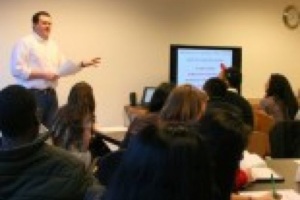Northside College Prep Students spend a day at The Associated Press

The series of lectures, workshops and discussions was organized by the News Literacy Project and two of its volunteer journalists on the AP staff, assistant central editor Anna Johnson and central region editor David Scott.
After giving the students a tour of the newsroom, Johnson spoke about her experiences covering the 2009 presidential elections in Iran. She noted that the widespread media blackout while she was there gave her a renewed appreciation of the importance of the First Amendment in the United States.
“Imagine if one day you woke up and your cell phone couldn’t make calls; you could no longer look at news websites and other sites like Facebook on the Internet; you couldn’t text, you couldn’t email, you couldn’t IM. And television stations no longer worked,” said Johnson, recounting what she experienced the day after violence broke out in Tehran.
Students then discussed the power of information and the reasons why the Iranian government — along with those, more recently, in Egypt and Libya — went to such lengths to stop their people from communicating. Johnson closed by reminding students of the importance of credible information to American democracy.
In a second lesson focused on the importance of maintaining standards in a competitive breaking news environment, David Scott explained that even though the concept of reporting is simple (“Talk to people, write down what they say, and tell others”), the process of confirming the details is actually quite complex.
Using the recent shooting of U.S. Rep. Gabrielle Giffords as an example, Scott reviewed how the story broke and explained why the AP was not among the first news organizations to provide reports on Giffords’ condition.
“It’s all about the information that you get and about asking ‘Who are you? How do you know? Are you in a position to know?’ and ‘Are you sure?’” Scott said. “In this instance, we weren’t sure, so we waited.”
As a result, the AP was not among those news organizations that initially reported, incorrectly, that the Arizona Democrat had died.
After the morning sessions, Northside students and AP journalists chatted over lunch, where student photographers’ questions to multimedia editor Shawn Chen and staff photographer Charles Rex Arbogast about their work led to a spirited conversation about photo permissions and copyright.
In the afternoon, the students attended smaller breakout sessions that targeted specific journalism skills. A group of student section editors and reporters worked with AP editors Chris Sundheim and Tim Jacobs on organizing information and writing solid news reports with effective leads. Sundheim and Jacobs have been serving as editorial advisers to Northside’s student newspaper, The HoofBeat, and during the workshop were able to refer to stories written by the students.
A second breakout session was led by AP videojournalist Robert Ray, who talked about the importance of visual elements in news stories as well as the increasing importance of offering multimedia content.
The final component of the day was a discussion and Q&A session with veteran journalists Tom McCarthy, Hugh Dellios, Sharon Cohen and Michael Tarm. The panel, representing more than 75 years of collective journalism experience, fielded questions on topics as diverse as WikiLeaks, the challenge of breaking in to the business as a young reporter, and the ways the news industry is adjusting to changes brought by the digital age.
After the event, which also was supported by the McCormick Foundation, the response from the journalists in AP’s newsroom — even those who didn’t directly participate in the event — was as positive and animated as that of the students and teachers at Northside. Though the News Literacy Project typically focuses on bringing journalists into the classroom to teach, it turns out that bringing the classroom to journalists is valuable as well.